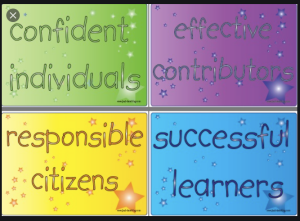 Curriculum for Excellence is widely recognised as an enlightened, forward-thinking, child-centred policy document, which fully recognises the significance of children’s health and well-being for educational success. In addressing the educational process from age 3 to 18, CfE also recognises that it is essential to take a developmental approach to pedagogy, so that children’s learning is supported at each stage – pre-school, primary and secondary – as appropriate to their age and level of development.
Curriculum for Excellence is widely recognised as an enlightened, forward-thinking, child-centred policy document, which fully recognises the significance of children’s health and well-being for educational success. In addressing the educational process from age 3 to 18, CfE also recognises that it is essential to take a developmental approach to pedagogy, so that children’s learning is supported at each stage – pre-school, primary and secondary – as appropriate to their age and level of development.
As the First Minister states in her introduction to the National Improvement Framework for Scottish Education, CfE ‘provides a broader education and sets higher standards for achievement than ever before. It has transformed the quality of children’s learning, and their confidence and motivation.’
Areas of concern
Nevertheless, since CfE’s introduction, Scotland has not made significant progress in terms of attainment in literacy and numeracy compared with other European countries, a fact which is generally attributed to a widening of the attainment gap between children from advantaged and disadvantaged home backgrounds. There is also concern about children and young people’s physical and mental health, and about the employment prospects of some school leavers.
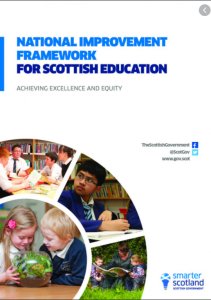 The four priorities of the National Improvement Framework are therefore:
The four priorities of the National Improvement Framework are therefore:
- improvement in attainment, specifically in reading, writing and numeracy
- closing the attainment gap
- improvement in children and young people’s health and well-being
- improvement in sustained school leaver destinations for all young people.
To pursue these aims, the Scottish government has announced, among other measures:
- a national system of standardised assessment for children in P 1, 4, 7 and S 3
- a survey of children and young people’s health and well-being.
It is easy to argue that data-gathering is unlikely to improve the quality of teaching and learning or the health and well-being of children and young people (and the argument is briefly outlined at the end of this paper). It is more difficult to suggest an alternative course of action for addressing the problems underpinning the four listed priorities. However, Upstart Scotland has a carefully-researched, evidence-based proposal for addressing these areas of concern.
Transformational change
The Curriculum for Excellence (like many other documents relating to children and education, such as Getting It Right For Every Child, the Early Years Framework and the recent Play Strategy) outlines admirable policies which should ensure that Scotland is the best place for children to grow up. However, at present, from the very start of the educational process, the policies concerned are not translating into practice.
Education does not, of course, take place in a vacuum. Children’s performance at school is inevitably affected by environmental and cultural factors beyond the school gates and over recent decades there have been considerable changes in terms of almost all Scottish children’s everyday experience:
- out-of-home childcare has become commonplace, even for very young children
- children’s habits of play are greatly changed, and outdoor play is increasingly rare.
Neuroscience and developmental psychology are in accord that the two greatest influences on children’s physical, emotional, social and cognitive development are
- the quality of their attachment to the adults who care for them
- opportunities to engage in play, which is the inborn human learning drive.
If children are denied (or have inadequate access to) these essential ingredients of healthy development, it is likely to have long-term effects on their physical health, emotional resilience, social competence and self-regulation skills.
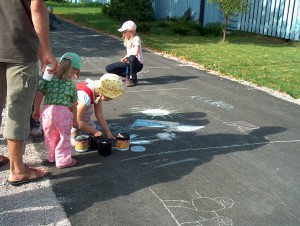 In the Early Level and Level 1 of CfE, early years practitioners and teachers of P1 and P2 do not feel able to take a developmental approach to children’s education, which up to the age of 6 or 7 should be essentially play-based (see below). There are also problems in ensuring that the quality of out-of-home care for children of three and four (and younger) is as high as it should and could be. If transformational change is to be brought about so that the education of all Scotland’s children is built on the firmest possible foundations, it is vital that these factors are addressed.
In the Early Level and Level 1 of CfE, early years practitioners and teachers of P1 and P2 do not feel able to take a developmental approach to children’s education, which up to the age of 6 or 7 should be essentially play-based (see below). There are also problems in ensuring that the quality of out-of-home care for children of three and four (and younger) is as high as it should and could be. If transformational change is to be brought about so that the education of all Scotland’s children is built on the firmest possible foundations, it is vital that these factors are addressed.
For all children, but particularly for those from less advantaged homes, the quality of out-of-home care in the early years is of immense importance. Similarly, if young children do not engage regularly in active, creative play (especially outdoor play) at home, they need plenty of time and space to play in the first three or four years of state-provided education.
Early education and the culture of ‘schooling’
The reasons behind Scotland’s failure to translate CfE policy into practice include:
- cultural attitudes to the function of ‘schools’, which are seen by the overwhelming majority of adults as a place where children are ‘taught by teachers’ and where the first priority is children’s acquisition of the three Rs
- parental expectations of what children should achieve when they start primary school (‘Is he reading yet?’)
- the influence of the increasing ‘schoolification’ of early years (EY) practice in the USA and UK
- the professional divide between EY practitioners and primary teachers, and their different approaches to education
- the hierarchical nature of the educational establishment, which results in EY authorities finding themselves at the bottom of the academic pecking order so that their voices are seldom heard in national debate.
Above all, and contributing to all the points listed above, is Scotland’s extremely early school starting age. When everyone in a nation has been schooled since childhood that schooling begins at five, or even four, cultural attitudes to the education of young children are fixed on ideas of ‘top-down teaching’ and an early introduction to the three Rs.
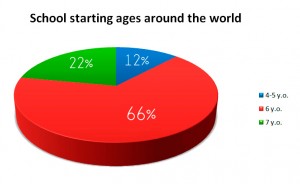 In fact, in 66% of countries worldwide, the school starting age is 6 and in 22% (including many that now perform well above average in international comparisons of educational achievement and childhood well-being) it is seven. Almost all of the 12% that have historically chosen to start school earlier – and whose performance in both education and well-being is distinctly lack-lustre – are members (or ex-members) of the British Empire.
In fact, in 66% of countries worldwide, the school starting age is 6 and in 22% (including many that now perform well above average in international comparisons of educational achievement and childhood well-being) it is seven. Almost all of the 12% that have historically chosen to start school earlier – and whose performance in both education and well-being is distinctly lack-lustre – are members (or ex-members) of the British Empire.
Scotland’s early school starting age not only means that formal schooling starts before many children are physically, emotionally, socially and cognitively ‘ready’ and able to take full advantage of it. It also meant that, when widespread demand for early childcare arose in the closing decades of the 20th century, it was only necessary to provide childcare for about two years. It was therefore seen primarily as ‘child-minding’ and the political emphasis was on getting parents into work, rather than on children’s development. So at a time when the quality of children’s early care and their need to learn through play is arguably more important than at any time in history, there was little interest or investment in these aspects of childcare.
In countries such as Finland, where – owing to a school starting age of seven – widespread demand for early childcare began in the 1970s, early years authorities have had forty years to develop a highly effective system of kindergarten care and education, while Scotland is still in the early stages of development. There has also been more support for Finnish early years educational development because children in Finland spend four years in their kindergarten settings, as opposed to Scottish children’s two years of pre-school ‘child-minding’ and two years of prematurely formal schooling. (This is extremely galling for EY specialists in Scotland, as our country has a very proud tradition of early years provision and scholarship, but – as stated above – the voices of EY authorities are seldom heard.)

It is no coincidence that Finland has, since international surveys began, been the highest (or near the highest) achieving country in both education and childhood well-being while Scotland – despite constant and considerable effort on behalf of its EY practitioners and teaching force – still struggles to deal with the four priorities listed above.
Upstart Scotland’s proposal
Upstart’s proposal is that Scotland should ensure all children have the effective, play-based, developmentally-appropriate start to the educational process recommended in CfE by the ring-fencing of four years (3-7) as a dedicated kindergarten stage, with a different ethos from the rest of the educational system.
The key defining difference in terms of ethos would be that, in the kindergarten stage, play is central to the learning process and adult support for children’s learning is based on each child’s developmental level, rather than curricular aims or arbitrarily-determined ‘outcomes’.
There is now considerable evidence that play is the inborn learning drive of our species. Along with sensitive adult support and guidance, children’s own active, self-directed play is widely recognised as critical to the development of:
- physical coordination and confidence, the ability to focus attention and control behaviour
- emotional strengths, including a can-do attitude, resilience and the patience to pursue long-term aims, rather than immediate rewards
- social competence, such as getting along with their peers, working collaboratively in a group and communication skills (including active listening)
- cognitive capacities, such as the use of language to explore and express ideas, and ‘common-sense understanding’ of the world and how it works, which underpins mathematical and scientific abilities.
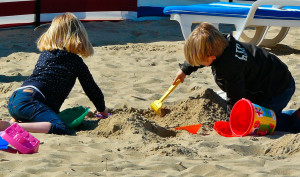 When play is allowed to drive the educational process until children are seven years old – rather than ‘top-down teaching’ and educational targets driving out play – there is the best possible chance of all children arriving in primary school with well-developed powers of self-regulation. Self-regulation is a far better basis for educational progress and lifelong resilience than meek compliance or, in the case of far too many children, bewilderment, fear and eventual disaffection.
When play is allowed to drive the educational process until children are seven years old – rather than ‘top-down teaching’ and educational targets driving out play – there is the best possible chance of all children arriving in primary school with well-developed powers of self-regulation. Self-regulation is a far better basis for educational progress and lifelong resilience than meek compliance or, in the case of far too many children, bewilderment, fear and eventual disaffection.
The aims of the Upstart Scotland campaign, to be launched in 2016, are therefore:
- to establish a statutory play-based ‘kindergarten stage’ for Scottish children – based on well-established developmental principles and similar to the systems in Nordic countries – with a recognisably different ethos from primary schooling
- to stress the importance, for long-term mental health and well-being, of ensuring that between the ages of three and seven children are free from the pressure of the formal school system and educational target-setting
- to raise awareness of the role of early years education in ‘levelling the educational playing field’, by providing all children with secure foundations for school-based and lifelong learning
- to argue the case for play (particularly outdoor play and contact with the natural world) as an inborn human instinct, vital to children’s physical, emotional, social and cognitive development, and seriously lacking in the lives of many 21st century children
- to highlight the importance of supporting children’s social, emotional and spoken language development in the early years, as the basis for successful later learning of the three Rs and educational achievement in general
- to draw attention to the extremely early school starting age in UK countries (as opposed to the rest of the world), and the growing evidence of a connection between ‘schoolification’ of early years education the widening achievement gap between rich and poor in the USA and UK
- to highlight the need for a well-qualified, highly-respected early years workforce with a common understanding of the principles of child development and the importance of ‘attunement’ (the capacity to ‘tune into’ young children’s needs, intentions and emotions) in anyone working with the under-sevens.
Further information and the first draft of an evidence base are available on www.upstart.scot.
The tests don’t work
Upstart Scotland is opposed to the introduction of national standardised testing of the type suggested in the National Improvement Framework. Testing systems of this kind have been in use in the USA and England for many years but according to a recent report by Professor Merryn Hughes (Exam Factories, 2015):
There is no evidence as yet that accountability measures can reduce the attainment gap between disadvantaged pupils and their peers. There is evidence that disadvantaged children, who on average have lower attainment than their peers and are therefore under greater pressure to meet targets, can become disaffected as a result of experiencing ‘failure’, and this is being exacerbated by recent changes to the curriculum to make it more demanding and challenging.’
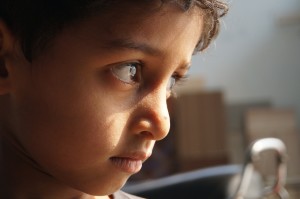 It therefore seems highly unlikely that standardised testing will make any significant difference in Scotland. It will, however, put extra pressure on pupils, teachers and parents to achieve good test results, so is also likely to result in a narrowing of the curriculum due to the well-known phenomenon of ‘teaching to the test’. So it will probably contribute to further ‘schoolification’ of early years practice, as it has in the USA and England.
It therefore seems highly unlikely that standardised testing will make any significant difference in Scotland. It will, however, put extra pressure on pupils, teachers and parents to achieve good test results, so is also likely to result in a narrowing of the curriculum due to the well-known phenomenon of ‘teaching to the test’. So it will probably contribute to further ‘schoolification’ of early years practice, as it has in the USA and England.
Testing may also adversely affect health and well-being, since a high-stakes testing regime will add to the many pressures that now beset the younger generation. Over the last decade, there have been reports of alarming increases in mental health problems among children and young people, especially in terms of attention deficit, depression, self-harm and eating disorders. The reasons behind these increases are undoubtedly complex, and associated with aspects of 21st century culture and lifestyles mentioned earlier, but psychologists now consider that a lack of emotional resilience is a significant contributory factor. Attachment and play during children’s early years are both recognised as ways of developing resilience.
Readiness for life
The arguments above have addressed the first three priorities listed in the National Improvement Framework:
- improvement in attainment, specifically in reading, writing and numeracy
- closing the attainment gap
- improvement in children and young people’s health and well-being
- improvement in sustained school leaver destinations for all young people.
A dedicated kindergarten stage would also address the final priority, since the purpose of kindergarten education is to develop ‘the whole child’. It is not concerned with a narrow definition of ‘school readiness’ but with readiness for life in general, and for lifelong learning.
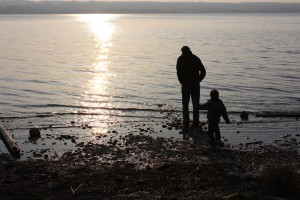 The life-skills required for success in the world of work are exactly those that nature designs children to acquire through play: social skills, perseverance, creativity, problem-solving ability, the capacity to collaborate and cooperate, and the powers of self-regulation needed to survive and thrive in any institutional setting.
The life-skills required for success in the world of work are exactly those that nature designs children to acquire through play: social skills, perseverance, creativity, problem-solving ability, the capacity to collaborate and cooperate, and the powers of self-regulation needed to survive and thrive in any institutional setting.
Upstart therefore urges the Scottish government to redirect the financial resources currently ear-marked for national testing towards
- the establishment of a kindergarten stage
- improving the capacity of the early years workforce
to ensure that all children start their education on the levellest of possible playing fields, physically, emotionally, socially and cognitively ready and able to learn.
Sue Palmer
Chair, Upstart Scotland
November 5th, 2015



As a teacher and parent, I wholeheartedly agree with your aims. I fundamentally disagree with national standardised testing of primary-age children. Let’s not ignore the fact that standardised testing already happens in many local authorities. In my experience, Education Scotland are particularly keen on these statistics too. No thought is given to the poor children who sit in groups, headphones on, in front of laptops clicking away as questions appear before them. This once-a-year experience is then used to measure their overall learning in key curricular areas with many parents requesting to see the results to compare how much their child’s score has risen (or not) since the previous year.
Instead of spending more money producing more statistics for politicians to beat each other over the head with in Holyrood, let’s look at investing in areas that you suggest here. I do think there will be much resistance from parents and the general public as play is heavily undervalued. It may be too late for my own children and I passionately believe that they would have greatly benefited from just what you are advocating, however there’s no time like the present and so I’d love to get involved with ‘upstart.
I was alerted to the existence of Upstart by my latest PGDE student who had heard me “mouthing off” on various occasions during her placement about why 4/5 was too early for children to start formal education. The course of Kindergarten (3 – 7) education which you propose makes perfect sense to me, I speak as a primary teacher of nearly 20 years standing who has taught at every stage and spent my first 6 years in teaching in Nursery. I am now in upper primary where the whirlwind of starting children in formal education too early is being reaped in disengagement and disaffection from learning and a drop in the very attainment statistics which Local Authorities and government seem to place such store in.
It is with despair and dismay that I have seen education being reduced to a “business model” by a succession of governments; the talk of “clients” and “stakeholders” being the terminology for children and parents, with tick boxes, target setting, attainment and tracking statistics being applied to pupils who are each unique and cannot be fitted neatly into boxes, coupled with the need to push children through “levels” within specific time frames without consideration of differing needs or rates of development. I worry about what we are doing to children, especially boys, who are not ready for school despite being of school age and who are being forced to conform to a standard model which ill fits them. Many are unable to sit still, attend and comprehend what they are being asked to do and this results in misbehaviour and “failure” to perform. This situation has become worse year on year over the course of my career. What are we storing up for the future in this approach?
When CfE first came into existence, I was gladdened by it’s seemingly child centred approach to learning but over the course of time have become disenchanted; what started off as a laudable set of principles was undermined by woolly thinking, lack of detail and a narrowing of curriculum content offset by a need to be accountable through endless data collection and attainment statistics. My main concern over the National Improvement Framework is the new “national” tests, as it seems they will further undermine CfE, which was supposed to get us away from the kind of testing involved in 5 – 14 and I believe will in the long term sound it’s death knell.
By subsuming nursery education into Early Level, we now have a scenario where, if anything, formal learning in P1 has been accelerated and the addition of endless meetings about tracking levels and attainment has driven CfE further from it’s initial intent and purpose. We desperately need to rethink early education in Scotland and extending the Kindergarten stage would be a good way to start. However, there is a long way to go to persuade parents that “play based” exploratory learning is a valid and worthy education for young children and that pushing small children into formal learning too soon is a seriously bad idea for their mental health. Having watched parents unintentionally “preparing” their children for P1 by telling them they have to be “a big boy/girl” I hate to think how this subliminal message translates in a small brain. The fact that many primary teachers themselves see nursery/infant education as somehow beneath them and view those who work at the early stages as “just playing all day” tells us a lot about the value placed on the early years. Parents then compound this view in their child’s second year, by telling staff their children are bored by nursery and ready for school, when the opposite is often true – their children are often lacking in the emotional maturity to be able to cope in a formal classroom but do need something different in the nursery setting.
I will continue follow this debate with interest as the future of education depends on just this type of development.
At the end it says Nov.2016, I think it should be 2015.
And you were completely right, thanks for letting us know!
Complete agreement here too. I’m not a teacher myself but come from a family full of school teachers – both my grannies taught primary 1 infants and discussions around schooling have always been part of my life.
I have three primary school children myself and wish to goodness they didn’t start school until age 7.
Teaching 5yr olds to score in tests – for any reason – is nonsense.
I want to see younger kids playing in the sun, splashing in puddles, laughing, crying, falling over and picking themselves back up. Life is about people and education must be about helping kids develop into individuals that make valuable contributions to the people and communities they live and work in.
Academic acumen is important but other skills and talents are too. The bottom line is that happy,fulfilled, secure and ‘connected’ individuals naturally meet the girfec criteria as tjey grow and learn through the ahool years and into adulthood.
People make the world go round!
This makes so much sense but I feel quite depressed reading it because my kids are 8, 4 and 2 and they probably won’t get the chance to benefit from such a system if it does get established.
If only I knew some Finnish (!)
My working life (and earlier than that), has revolved around children, including Severe and Complex Special Needs. In my nursing life, I specialised in that field, I have since added 5 children to my family fold, bridging over 2 decades, worked in Early Years education (Early Years Practitioner), again often with a focus on vulnerable children and additional support needs as well as general education (2-6 year olds) and outreach work with families who have children up to age of 5. Now I work voluntarily within Support from the Start network in East Lothian. There is no doubt that children are experiencing less free play. Focus on starting formal education earlier and earlier (makes no sense, it is before children are developmentally ready) and so we cannot achieve the results politicians desire of academic fulfillment in this knowledge based world, nor can we maximise emotional health, resilience and well-being. Life skills are suppressed through these dual factors of early formal education and less and less free play. We are not working in the same playing fields of yesteryear when children had so much more free playtime to develop their skills, mixed year groups playing together in streets and woods etc, less supervision of adults and all the benefits of that. Add those elements to the fact that there are other changes, more screen time for very young children along with more time in harnessed seats etc for babies and infants – so many factors are combining. We can’t make significant improvements without making significant change that works for engaging, developing young bodies and minds, matching how they develop and encouraging / fostering the right environments for learning. For these reasons, I wholeheartedly welcome and support the Upstart movement for kindergarten. Specialised support building on the considerable expertise which already exists here, recognising the essential difference in how to be an educator with our youngest children and re-writing the education through schools to reflect the re-wiring that needs to happen. We will reap the results for years to come, stop being a system that creates problems and it will give us the necessary tools to improve health, well-being, skill-sets, empathy and resilience, the academic attainment and the coffers in the state bank as other elements also improve regarding strain on services, effective help for those who still require it and a teaching / educator bank of professionals empowered to meet the mutual goals of their client group, (and families) and their governing bodies.
Having fostered a child with severe attachment issues for the last six years, I have seen just how damaging the current system can be to children who are developmentally challenged.
Despite all of your instincts, (never mind the science), telling you “this child cannot cope with anymore stress,anxiety,fear, challenging expectations, feelings of failure and humiliation” We as responsible and law abiding adults, have no choice but to go along with the “system”. We are most definately storing up mental health issues for the future and bringing up kids who feel stress at the sight of a book.
Can I also mention that these pressures also have a profound physiological effect on the child i.e. sleep deprivation and digestive/bowel issues.
I so wish the Scottish government would listen to the evidence and begin to implement the advice from Upstart.
I am an early years worker in South Lanarkshire. I fully agree with the idea of extending the early years period to 7 years of age. This makes perfect sense to me, it allows children to develop holistically. There is a huge difference between what is expected from our children in nursery and what is expected from them in P1. The Scottish government is on the right track and has pursued a high quality early years provision for its children. This focus is welcomed, I hope this will eventually lead to the extension of the early years period.